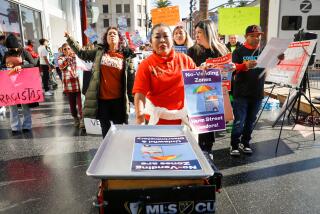Trash Talking Over Recycling : Environment: GOP influence in Legislature puts much-heralded state program under attack. Bigger battles loom as environmentalists and pro-business forces lock horns.
There was a time in America when rivers caught fire, lakes died, pelicans vanished and bottles and cans--”no deposit, no return”--littered country roads and city alleys.
Not much Everett Winston Jr.--dedicated recycler that he is--could have done about cleaning up the Cuyahoga River in Ohio, Lake Erie or San Francisco Bay. But he does his part on the bottles and cans front--anywhere he roams with his liberated supermarket shopping cart.
On good days, Winston steers his jiggling cargo through the industrial maze of south Sacramento to the weighing scales of Ming’s Metal Recycling. There, proprietor Kenny Luong rewards Winston’s contribution to a cleaner environment with what he came for: cash.
Forty dollars tops for a crushed load of aluminum cans.
But Winston does not have the luxury of policing littered roadways. Thanks to the successes of recycling in California, he is forced to look elsewhere. Clambering over the high metal sides of large commercial receptacles outside bars, nightclubs and restaurants, he plows through the crud looking for redeemable plastic, glass and aluminum containers.
A “dumpster diver” who has been collecting cans and bottles for years, Winston, 40, stays at it, hating it but needing it to make ends meet. “If it wasn’t for the money. . . .”
He talks of bathing in a mixture of rubbing alcohol and Pine Sol just to get the stink off.
Because there is money to be made or redeemed, whether the hard way like Winston does it, by consumers cashing in their empties or by businesses working the margins, beverage container recycling in California thrives.
Credited with being one of the few and most effective in the nation, the California system recycles 80% of its 13 billion recyclable bottles and cans sold annually, according to the state Department of Conservation.
Recycled beverage containers account for only 3% of total waste disposal in California, but it is an ugly 3% if left at roadsides.
Overall, the state is recycling one-quarter of 45 million tons of waste generated annually and aims to reach 50% by 2000, according to the state Integrated Waste Management Board.
Until recently, political forces and vested interests stood by the bottle and can program, holding the system together since it was created in 1986 by trade-offs and compromise. This year, as conservatives in the Legislature gained in numbers and strength, the manner in which the state administers the beverage recycling program came under fundamental attack, and bigger battles loom ahead.
Passed by the Legislature and signed into law this year by Gov. Pete Wilson were several elements that environmentalists, legislative aides and some industry voices say will weaken laws governing container recycling, unburden industry from recycling responsibilities, or both.
The principal bill, by state Sen. Jack O’Connell (D-Carpinteria), is described by its supporters as balancing the demands of pro-business political forces and those defending or wanting to expand the existing system. It was the “perfect” compromise bill, said O’Connell. “Everybody was equally happy. Everybody was equally unhappy.”
But this and other legislation was interpreted by many as weighted solidly in favor of business interests. For example:
* For the first time, fees paid by the glass and plastic container makers to support recycling will be reduced $22 million.
* Glass bottle makers were required under past legislation to add increasing amounts of recycled glass to their output, accelerating to 65% by 2005. Now, the maximum recycled content of recyclable glass bottles will go from 25% this year to 35% next year, and rise no higher.
* A separate subsidy to recyclers operating on supermarket parking lots--a boon for the big grocery chains relieved of collecting recyclable material themselves--stays in place for at least three more years instead of expiring as planned at the end of this year.
* State law setting minimum standards for use of the terms recyclable and recycled on product packaging were repealed. Left to follow less stringent federal guidelines, manufacturers will be allowed to include substantially less recycled material to justify such labeling claims.
More benefits for businesses can be expected from an increasingly conservative, pro-business Legislature, said Mark Murray, executive director and lobbyist for the environmental group Californians Against Waste.
As a counter-strategy, environmentalists are mounting a statewide voter initiative. The 24,000-member Californians Against Waste group has filed to place an initiative on the November, 1996, ballot that would keep the state-run recycling programs intact, and expand the field of recyclable containers to require deposits on wine and liquor bottles.
Only 25% of the 204,000 tons of wine and liquor bottles being discarded every year manage to reach recyclers.
Murray, of Californians Against Waste and a Sacramento lobbyist, said he and legislative allies supported a bill last year that would have expanded the mix of recyclable containers in a modest way, to include fortified wine bottles, “but then came the November [1994] elections.”
A new Republican majority in the Assembly, exerting a pull to the right on Democratic members as well, along with heavy lobbying by wine and glass industries opposed to expansion, would have effectively blocked adding new containers to the program, Murray said. “We withdrew the bill” before it was heard in a historically friendly-to-recycling Assembly committee.
“Previously, we had always been able to get legislation expanding recycling through the Assembly Natural Resources Committee. This time we didn’t,” Murray said. “We’re dealing with a changed Legislature. Next year, we foresee no opportunity to advance a positive agenda.”
The committee chairman, veteran Assemblyman Byron Sher (D-Palo Alto), is referred to by people on both sides of the issue as “the godfather of recycling,” consistently a leader in shaping environmental measures.
But his influence is seen as waning. Sher, who will run for the state Senate next year, is still the committee chairman but must contend with a Republican majority on the panel and plans to resign as chairman next year.
Additionally, according to a source in the beverage industry familiar with legislative negotiations, Sher did not play his usual commanding role in so-called bottle bill legislation enacted this year, in which Republican and business interests exerted new influence.
With Sher’s departure from the Natural Resources Committee chairmanship, a likely successor is the panel’s vice chairman, Assemblyman Keith Olberg (R-Victorville), a conservative freshman who took the lead this year in trying to reshape beverage container recycling policy along pro-business lines.
One executive for a major soft-drink bottler was so pleased with Olberg’s forceful presence on the issue that he predicted the assemblyman would be “governor some day.”
Olberg said repeatedly that he is not opposed to beverage container recycling--just the way it is administered.
The program is administered through the recycling division of the Department of Conservation and oversees the massive exchange of money that is expected to return about $250 million in deposits next year.
In addition, officials oversee a state fund that builds up from container deposits that are never redeemed, now totaling $66 million. That money is used to provide subsidies for a variety of recycling programs that the Legislature has determined may need assistance. Surplus redemption funds also go to nonprofit groups as grants, state youth programs and, for the first time next year, state parks.
Olberg said “a market-oriented” approach to bottle and can recycling should replace the strict state controls. “There is definitely something wrong with any system of government that does not allow the market’s voice to control [recycling] in such a way that you both benefit environmentally and economically,” Olberg said.
He believes market-controlled recycling “would meet or exceed [present] environmental objectives and do it in a much less costly way.” How a business-run system could outperform the program administered by the Department of Conservation, Olberg said, will be the subject of a study in coming months or years.
The major sore point for the bottling industry is a separate processing fee that the state requires it to pay. The state uses that money to pay recyclers to recycle the scrap glass. Without that money, it would be unprofitable for the recyclers to operate.
By the latest formula, glass manufacturers, for example, will be billed by the state at the rate of $65.72 for every ton of bottles they produce.
Jeff Brown, a spokesman for PepsiCo Inc. and president of the California-Nevada Soft Drink Assn., calls this and other aspects of the state-run recycling program “seriously flawed.” True, he said, recycling objectives have been met or exceeded, “but at what cost? It’s more expensive to beverage producers because of the state’s micro-management of every facet of this program.”
One such facet in new legislation effective Jan. 1 benefits manufacturers by offsetting their so-called processing fee costs with a $22-million subsidy from the state’s surplus redemption fund.
Nevertheless, like Olberg, Brown said he would “like to see a more free market approach that got the state out of the garbage business and let commodity prices dictate costs.”
Recyclers remain divided over another subsidy, called a handling fee, paid from the surplus. A total of $18.5 million is set aside to be distributed only to recyclers who have set up receiving points in supermarket parking lots. These operators are called convenience zone recyclers because of their ready access to the public.
Other recyclers, typically located in industrial suburbs, say their convenience zone competitors have used their state funding to engage in predatory pricing, offering better deals to customers turning in highly profitable aluminum cans.
Roger Bassett, a manager at Garbage Reincarnation, a traditional recycler based in Sonoma, said that the system amounts to creating “welfare queens,” with some recyclers getting subsidies and some not.
Reed Davis, a La Jolla recycler who operates beverage container collection points on 36 parking lots, disagrees. “I’d love to have old-line recyclers tell me how to . . . make any money or cover our bills without the handling fee,” he said.
More to Read
Inside the business of entertainment
The Wide Shot brings you news, analysis and insights on everything from streaming wars to production — and what it all means for the future.
You may occasionally receive promotional content from the Los Angeles Times.






